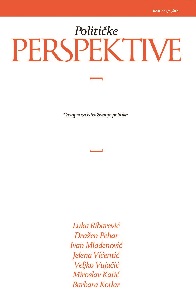Politička stabilnost u duboko podijeljenim društvima: nalazi iz postdejtonske Bosne i Hercegovine
Political Stability in Deeply Divided Societies: Evidence from post-Dayton Bosnia and Herzegovina
Author(s): Stefan VukojevićSubject(s): Government/Political systems, International relations/trade, Inter-Ethnic Relations, Peace and Conflict Studies
Published by: Fakultet političkih nauka Univerziteta u Beogradu & Fakultet političkih znanosti u Zagrebu
Keywords: Bosnia and Herzegovina; Dayton Peace Agreement; Consociation; Political stability; International administration;
Summary/Abstract: This article explores the causes of political stability in deeply divided societies. Building upon literature on consociationalism and post-conflict management, in the case of post-Dayton Bosnia and Herzegovina, we determine periods of political stability and explain their causes. According to the widespread arguments on BiH, consociational institutional design has replicated and cemented deep ethnic cleavages and bolstered centrifugal and nationalistic politics, while external actors tried simultaneously to make the state stabile and functional through their interventionist involvement. When the external actors mitigated their interventionalist approach in early 2006, the political situation began to deteriorate. The goal of the article is to explain periods of political stability by identifying the causes arising from the interaction between external actors and local elites within a constraining structural and institutional context. It argues that, alongside external actors, the political stability depends on the type of governing parties i.e. whether they are moderate or hardlines.
Journal: Političke perspektive
- Issue Year: 13/2023
- Issue No: 2
- Page Range: 109-130
- Page Count: 22
- Language: Serbian

